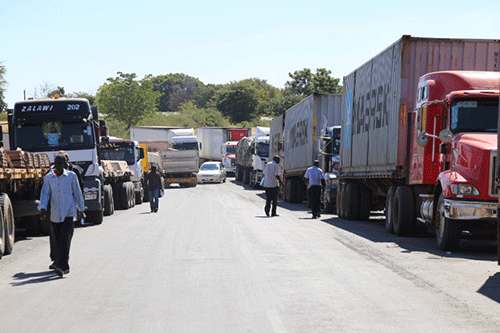- HOW TEMANE-MAPUTO ELECTRICITY TRANSMISSION LINE PROJECT IS GOING THROUGH TEST IN MOZAMBIQUE
- NEWLY OPENED PLASTIC RECYCLING PLANT SET TO HELP COMBAT NAMIBIA's PLASTIC INDUSTRY
- PROGRESS MADE ON PIIM PROJECTS AS OVER 85% COMPLETED IN ANGOLA
- WORLD BANK KICK-OFF INSPECTION OF USMID PROGRAM IN UGANDA
- ALGERIA MINISTER RECIEVED HARBOR ENERGY CEO OVER ENERGY PARTNERSHIP
NAMIBIA GOVERNOR CALLS FOR KATIMA MULILO BORDER PROJECT TO BE FAST-TRACKED

Zambezi regional governor Lawrence Sampofu has called for the fast-tracking of plans to turn the Katima Mulilo border post into a one-stop border post (OSBP), as well as for it to start operating on a 24-hour basis.
He made this call during his State of the Region address at Katima Mulilo on Thursday.
Sampofu said the slow progress on the extension of operational hours and the establishment of an OSBP as a trade facilitation measure to mitigate bottlenecks at the Katima Mulilo border post is a challenge.
He said the Ngoma and Katima Mulilo borders, together with other legal points of entry, recorded a total of 225 340 entries and 214 892 departures, of which the majority was recorded at the Katima Mulilo border post.
“The Katima Mulilo border post is rated among the top revenue collectors in the country, hence the greater need to revamp the border to an OSBP, as well as transition to a 24-hour operation,” he said.
Sampofu said seeing that the Ngoma and Katima Mulilo borders are situated at the juncture of the Kavango-Zambezi Transfrontier Conservation Area (KAZA-TFCA), the volume of cargo passing through them using the Walvis Bay-Ndola-Lubumbashi Development Corridor has significantly and steadily increased, overpowering the current border infrastructure.
“There was an increase in cargo volume handled through the Katima Mulilo and Ngoma border posts during the year under review, compared to the 2021/22 financial year. The reopening of borders after Covid-19 resulted in an increase in overall trade imports and exports and an increase in cargo volume through the port of Walvis Bay, passing along the Walvis-Bay-Ndola-Lubumbashi Development Corridor,” he said.
Sampofu said the regional directorate received 463 asylum seekers from countries such as the Democratic Republic of Congo, Rwanda, Burundi, Cameroon, Malawi, Zimbabwe, Chad, Tanzania, Ethiopia, Mozambique, and Uganda.
“They were all registered and transported to the Osire Refugee Settlement,” he said.
RURAL INFRASTRUCTURE DEVELOPMENT
As far as bringing services closer to the people is concerned, Sampofu said the construction of services at Kongola Settlement is ongoing at a cost of more than a million.
“The contractor is busy with the installation of two water reservoirs that will provide water to the whole settlement, and progress of the works stood at 86%.
“Meanwhile, at Ngoma, the construction of sewer service infrastructure was completed at a cost of more than N$2 million. This is a sewer line meant to connect all government institutions and other private entities,” he said.
Sampofu said there is a lot of progress on the construction of service infrastructure at Chinchimane.
“The next step will be the subdivision of plots within the settlement boundaries,” he said.
Regarding regional academic performance, Sampofu said during 2022, performance in the Namibia Senior Secondary Certificate Ordinary Level and Advanced Subsidiary Level slightly improved, as 466 (14,3%) pupils qualified, compared to 375 (12,2%) in 2021.
“Regional performance requires major improvement in intermediate and senior secondary grades,” he said.
He then shifted to the conservancies, saying that 14 conservancies and one association generated an amount of about N$37 million, compared to about N$33 million in the previous year.
Sampofu said about N$12 million was paid out as benefits to community members.
“Despite the above achievements, an amount of N$459 553,34 was unaccounted for within other conservancies,” he said.
Sibbinda constituency councilor Micky Lukaezi during discussions after the State of the Region addressed critiqued the regional budget allocation for water and electricity, saying “It’s peanuts”, resulting in the community on the ground suffering.
“Especially in my constituency, where water is not found easily when drilling boreholes, more funding is needed for exploration.
“Some of the boreholes have not been working since last year, and this has been reported to the rural water supply division, but they cannot do much due to budgetary constraints,” he said.

